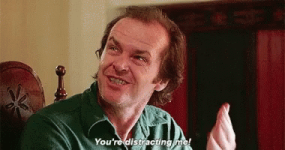TheRedChamber
Apprentice
- Joined
- Mar 21, 2014
- Posts
- 2,397
So this kind of came up in my thread about serendipity which just got, if not necroed, than at least jolted back into life, but I think it's an interesting enough topic by itself to warent its own thread.
For those who don't know, 'planners vs pantsers' is a common phrase for distinguishing writers who make substantial plans for their work before starting to write against those who 'fly by the seat of their pants' and start to write with little idea of where the story is evenutally going to end up. From previous threads, I'm probably nearly as far along the planner end of the spectrum as it's possible to be and thus am frequently bewildered by writer who claim they know literally nothing about their stories before they start to write (and seemingly I bewilder them just as much).
So my question is thus very simple. As a pantser writer, you have a whole afternoon free to write, you've got nothing in progress (at least nothing you want to work on), and you open up a new document file (in the format of your choosing). As you strike the first key, what do you actually know (or suspect) about your story? Characters? Settings? Events? Length? Genre? Sexual activities?
For those who don't know, 'planners vs pantsers' is a common phrase for distinguishing writers who make substantial plans for their work before starting to write against those who 'fly by the seat of their pants' and start to write with little idea of where the story is evenutally going to end up. From previous threads, I'm probably nearly as far along the planner end of the spectrum as it's possible to be and thus am frequently bewildered by writer who claim they know literally nothing about their stories before they start to write (and seemingly I bewilder them just as much).
So my question is thus very simple. As a pantser writer, you have a whole afternoon free to write, you've got nothing in progress (at least nothing you want to work on), and you open up a new document file (in the format of your choosing). As you strike the first key, what do you actually know (or suspect) about your story? Characters? Settings? Events? Length? Genre? Sexual activities?
